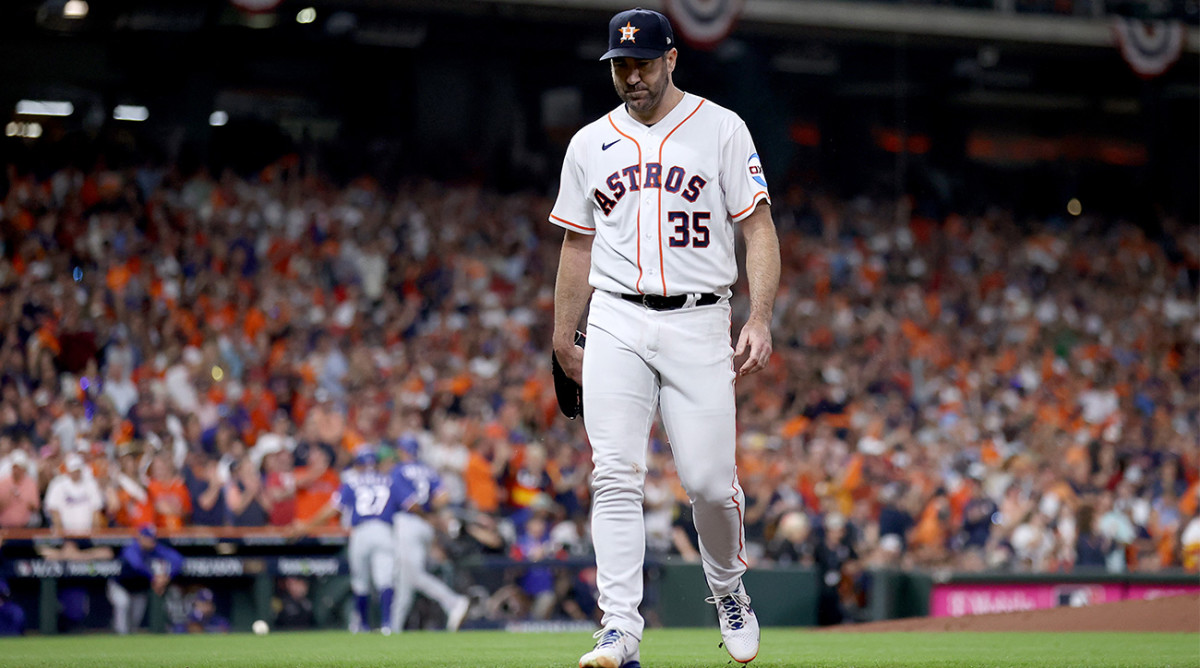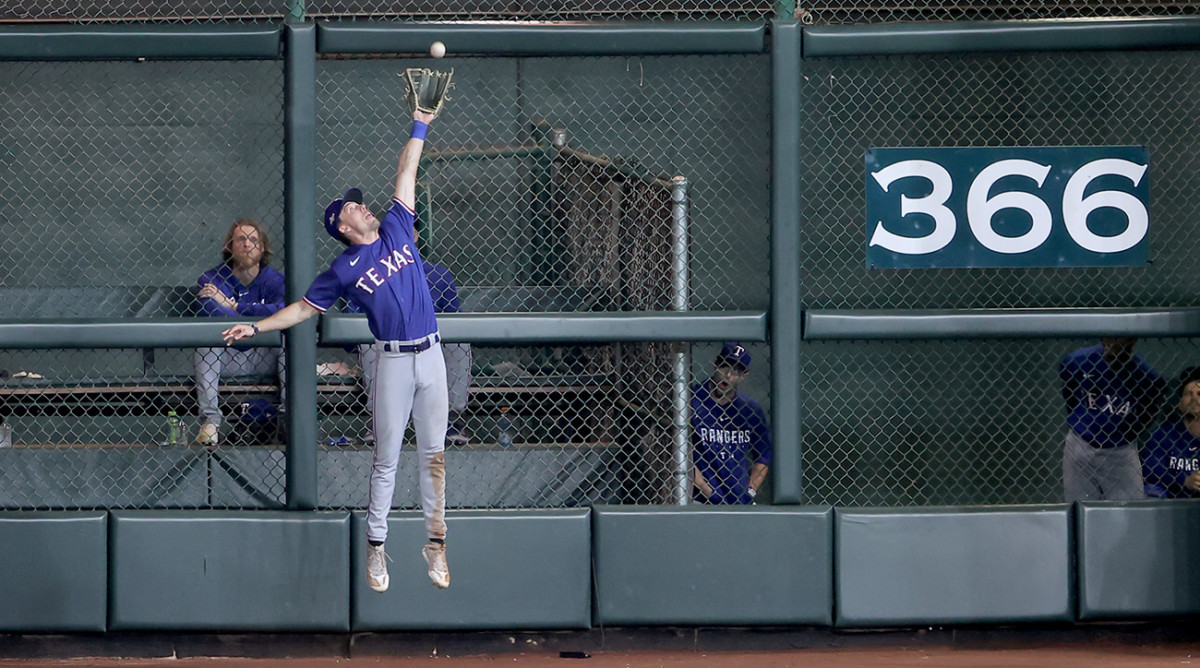Rangers Should Terrify MLB’s Remaining Playoff Teams

This is what the fury of an avalanche sounds like when it has made up its mind to head downhill. This is the terror of a tractor trailer that has lost its brakes on a long decline. This is what a dangerous postseason team looks like.
The Rangers have played 54 innings of baseball this postseason and trailed after one of them. They are playing hospital-grade clean baseball. They are 6–0 this postseason, and the record somehow doesn’t indicate how well they are playing.
“Yes, momentum is a real thing this time of year,” said Texas pitcher Max Scherzer. “Everybody is just so locked in right now.”

Take a snapshot of American League Championship Series Game 1 on Sunday night and submit it for hanging at the National Portrait Gallery in Washington, D.C. It was as dead-on a rendition of winning postseason baseball as you will find.
Just the partial list of what the Rangers did well in a 2–0 win over Houston must start with this incredible stat: Astros ace Justin Verlander, one of the greatest fastball pitchers of this generation, unleashed 47 of his famous heaters at the Rangers and not once could he get a swing and miss.
There was superb defense, especially because Rangers coach Will Venable, who runs Texas’s outfield positioning, refused to fall into the fail-safe trap of most teams who venture into Minute Maid Park and play their left fielder toward the wider space in the gap where the outfield wall juts back.
There was pitching coach Mike Maddux, an old baseball soul who is symbolic of Rangers president Chris Young’s return to baseball roots, making two deus ex machina mound visits in the first four innings to save the game.
The Astros had better deploy a tire-puncturing roadblock in Game 2 on Monday to stop Texas, lest it keep running the table like the 2014 Royals, who reeled off eight straight postseason wins before Madison Bumgarner stopped them in the World Series.
Texas is playing so well it beat Verlander with only two runs on a night when Verlander had outstanding stuff. One of the additions to Minute Maid Park this year is an LED ribbon board that rings most of the ballpark. The Astros use the board to post pitch metrics, such as induced vertical break, a measurement of pitch movement when you remove the effect of gravity. Verlander has learned to use the board as his study guide in real time.
After virtually every pitch in Game 1, as is his custom, Verlander would turn toward the ribbon board in right center field for the pitch metrics. For instance, Verlander throws his fastball with an induced vertical break of 18.8 inches. Think of it as a measurement of fastball “ride,” or how well a fastball holds its plane. Verlander’s average of 18.8 is an elite measurement.
In ALDS Game 1, Verlander averaged 19.9 of “vert.” When Verlander looked to the board in ALCS Game 1, he was happy to see he was commonly throwing fastballs with 20 vert and higher. He saw those measurements and confidently kept throwing heaters.

“His stuff,” Scherzer said, “was really good. I saw the 20s. He pitched well. We just had really good at bats.”
The Rangers simply turned back his best fastballs. They swung 27 times at his fastball, swatting away 19 of them for foul balls. Verlander’s inability to get anyone to miss his fastball, especially for a third strike, was mind-bending. The Rangers announced their intentions by swinging at the first pitch nine times among their first 13 plate appearances. In the second inning, preternaturally cool rookie Evan Carter jumped a 2–0 Verlander fastball for a double, and Jonah Heim rapped the next one for an RBI single, setting the night in motion.
“I think they brought it into a plan,” says Rangers hitting coach Tim Hyers, “That was part of the mission: You’ve got to make sure that we can’t just let him throw his fastball at will.
“You know, we didn’t put as many in play as hard as we wanted to, but at least we fought him off. We didn’t let him just kind of have his way with the heater, and I think that was a big key. I mean, it’s one of the best fastballs still in the league. And it’s a credit to the guys, the way they fight and the way they were zoned in and disciplined—not to chase it around the zone, but to create timing to get the barrelhead there.”
The 1–0 lead was imperiled one inning later, when Texas starter Jordan Montgomery was to face Houston slugger Yordan Alvarez with runners at first and second and two outs. That’s when Maddux swooped in—or strolled, given his leisurely and intentional pace to visit Montgomery on the mound.
“That’s Mike,” Heim says. “Sometimes he goes out there just to tell a joke. You never know.”
“No joking around this time,” Maddux says. “Just letting him catch his breath. It ended up being a 28-pitch inning.”
Maddux has been a pitching coach for 21 seasons, 12 of which have been with postseason teams. One of the first things he did upon leaving St. Louis for Texas this year was to install strings at the top of the strike zone at the bullpen mounds. A few generations ago, teams used strings at the bottom of the zone to encourage pitchers to work their fastball down. Maddux brought the strings back but raised them, a way to remind his pitchers that establishing up is an avenue for getting strikes down. The growth of Montgomery, who pitched for Maddux in St. Louis and Texas, is an example of playing that high-low game with deploying four-seamers to complement his sinkers. Montgomery became the first lefty to shut out the Houston offense at Minute Maid Park over at least 6⅓ innings since May 2022, when Texas’s Martín Pérez did it.
“What impressed me most tonight is just what a competitor he is,” Maddux says of Montgomery. “No moment is too big. It’s also, in our dugout talking between innings is great. He tells you what he’s going to do. ‘I’m going to do this. Last time I did this, I’m going to do this.’ Or, ‘You know, this still plays. I’m going to do it again.’
“He has a pretty good feel for what he wants to do. Plus, he commands the ball. If you command the ball, you can game-plan for anybody.”
Maddux says he did not bring up suggestions about how to pitch to Alvarez to get out of that jam.
“That’s Jonah Heim,” Maddux says. “That’s Jonah Heim really rising to the occasion. He’s great at reading swings. We have our plan. But you have to give credit to Jonah. I’m just out there letting him catch his breath.”
Heim and Montgomery started Alvarez with four straight fastballs. They tried a changeup to bring the count full. They went back to another fastball, which Alvarez fouled. That’s when Montgomery threw a curveball that Alvarez chased for strike three. In the biggest sequence of the game, Montgomery threw Alvarez seven pitches, all on the edges of the plate and five of them being fastballs.
Alvarez whiffed three times and grounded out to first, prompting Astros manager Dusty Baker to say, “They had a pretty good game play, which Mike Maddux is one of the best at game-planning.”
The same script that pulled Texas out of the second-inning trouble repeated itself in the fourth. This time the bases were loaded with two outs and Martín Maldonado at the plate when Maddux decided it was another good time to take his Sunday stroll. And then Heim called for four straight fastballs to strike out Maldonado.
“Game management,” catching instructor Bobby Wilson says. “Great game management.”
Likewise, Venable made the astute move of playing Carter in his usual spot in left field rather than shading him to the gap to cover the bigger area.
“We went by what the [spray] charts tell us rather than going by the ballpark,” Venable says. “We didn’t change because of the ballpark.”

The positioning allowed Carter to rob Jose Altuve and Alex Bregman of possible extra-base hits and forced Houston third base coach Gary Pettis to hold a runner on second, Chas McCormick, on a two-out single. Carter later ventured into that left field gap cutout to make a leaping catch at the fence to take a double away from Bregman. It became a double play when Altuve, who crossed second base when there was no need to do so, failed to retouch the bag on his way back to first. Carter was playing his first game in the ballpark, though as with everything else about the rookie this postseason, you could never tell.
To complete the picture, the Texas bullpen continued its turnaround to make the 2–0 lead hold. The Astros sent their last 16 batters to the plate without getting a hit.
Where does this powerful forward inertia come from? How does a team that coughed up a 2 1/2 game lead with four games to play—including a last-day shutout at the hands of Seattle—suddenly become a rolling boulder of a team? To hear Young tell it, it comes from having blown a first-round bye with that last loss. The Rangers had already flown from Dallas to Anaheim to Seattle and now instead of returning home for five days off they had to fly from Seattle to Tampa.
“When that plane landed, when we got in that Monday, we were a different team,” Young says. “The families flew in to meet us there. I could just sense a commitment, a sense of purpose, like we knew we had missed an opportunity, but this was the reality we got. There was no turning away from it. The group immediately seemed different—intentional, focused. I felt it.”
Says manager Bruce Bochy, “I’d much rather have had the days off than to have to go on the road to Tampa Bay and play in their ballpark.”
But from such a cauldron—Dallas to Anaheim to Seattle to St. Petersburg to Baltimore to Dallas to Houston—was forged this beast of a team.
“There’s no doubt it has bonded this group,” Young says.
The Astros have a major problem on their hands. The Rangers are dangerous. They don’t swing and miss at Verlander’s 20-vert fastballs. They don’t drop the ball on defense. They don’t miss anything from a game management perspective.
They don’t lose.
